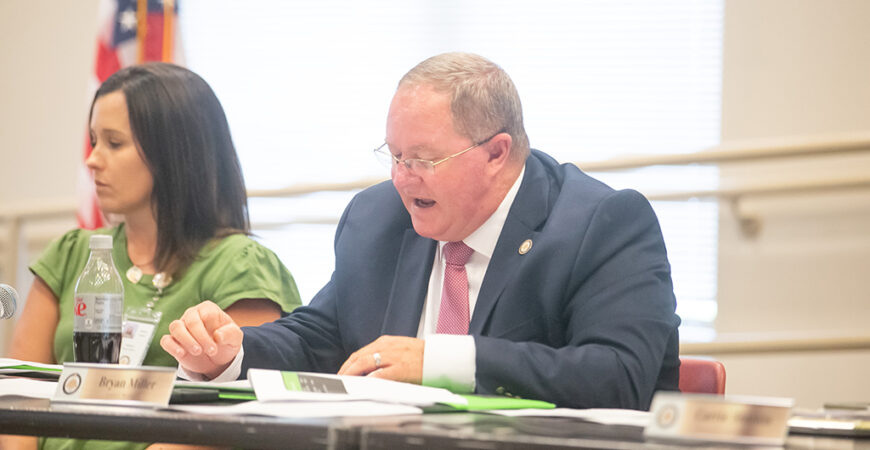KENANSVILLE – County Manager Bryan Miller presented the $103,261,283 proposed FY 2024-25 budget at the June 3 Board of County Commissioners meeting for the board’s review and consideration.
The total proposed budget increased by 4.5% from last year. The general fund of $69,128,323 reflects an increase of $1.6 million in recommended expenditures with a fund balance appropriation of $3,305,554 and estimated revenues of $65,822,769.
The general fund highlights a mandatory increase in retirement contributions to 13.66% for all non-sworn law enforcement officers, and 20.04% for sworn law enforcement officers, with 5% of that being a 401k contribution.
There was a 3% increase to budgeted insurance costs per employee. Miller explained that instead of passing those expenses on to employees, the county absorbed the increase.
Property tax revenues are estimated to increase about 2.45%. The budget also includes a cost-of-living adjustment, along with recruitment and retention increases for public safety departments, Capital requests of $796,428 and 5% increase to Duplin County Schools’ contributions in the amount of $500,008.
The contributions from the general fund to Duplin schools have increased by half a million dollars each year for the last three years; school capital requests have also increased by half a million since last fiscal year.
“The combined contributions have increased close to $1 million,” said Miller. “I think that speaks a lot to the commissioners’ dedication to our children’s education.”
The biggest changes in general fund revenues are in sales tax revenues, which decreased 5.97% and a significant decrease of 56.57% in the restricted departmental revenues – this is the revenue brought in by building inspections.
There was a 38.18% increase in the other revenue category. This category includes interest earned, rebate received by PCART program, interdepartmental sales, and labor charged monthly to the departments. Departmental revenue increased 18.58% and a 2.51% increase in ad valorem.
Among the highlights in the general fund expenditures, is an increase of 22.48% in the debt service category, which includes the commons USDA payment of $578,270 and the animal services red leg loan payment of $130,000, said Miller.
In contributions and transfers there is an increase of 13.51%, this includes the county contributions to the airport fund, capital reserve fund, employee insurance fund, forestry service, local mental health, and local fire departments.
In the cultural and recreational category there is an increase of 24.23%. This includes the library, parks and rec, event center, and the museum.
There is an increase of 7.2% in public safety expenditures from. These expenditures include sheriff’s office, jail, EMS, communications, animal services, fire marshal, and emergency management.
Government expenditures increased 7.55% and that includes all other departments.
Other funds increased in the following areas:
- Emergency Telephone $435,376 increased by $202,401
- Capital Reserve-Education $5,261,944 increased by $2,105,672
- Enhancement/Preservation $25,000 increased by $4,400
- Property Revaluation $478,597 increased by $6,730
- Fire Districts $4,270,773 increased by $446,022
- Transportation $1,633,767 increased by $238,510
- Airport $1,557,449 increased by $94,168
- Water Funds $3,782,125 increased by $526,623
And decreased as follows:
- Debt Service $4,706,589 decreased by $2,126
- Water Fund – Debt Service $977,063 decreased by $5,656
- Solid Waste $4,536,277 decreased by $104,420
- Insurance Fund $6,467,000 decreased by $694,150
“Capital requests in the enterprise funds include four vans for transportation, a zero-term board for the airport, and various equipment for solid waste. Northeast fire district rate decreased in 2019 when the revaluation happened. After the flood, a lot of river landings valuations went down. So, Northeast requested to change that rate back then from $0.07 to $0.09 per $100 valuation so the fire department would not lose revenue. Now that the revaluation is about to happen again, there’s a lot of structures that have been rebuilt so the valuations are going to rise. This decrease in the rate will level revenue back to a reasonable amount,” said Miller.
“This budget preserves our services and recognizes employees as our greatest asset and begins setting the foundation for long-term financial sustainability. The Board of Commissioners’ commitment to resilience, fiscal improvements and long-term sustainability will be the stabilizing factor in our ability to maintain and improve our financial position and weather future storms,” said Miller.
“The last four years have been plagued by uncertainty and instability caused by the pandemic, inflation, supply chain delays and labor shortages. Navigating these on-going crises has been a team effort and our employees have preserved, through personal sacrifice and dedication, to the citizens of the county, many of which are here tonight, and I just want to say thank you. I cannot thank our employees enough for their hard work and willingness to serve our great county.
They are truly our greatest asset. Thank you to all the county department heads and leaders and to our finance department for your assistance and dedication in developing this budget under continued pressures and unprecedented circumstances.”
A second public hearing took place after Miller presented the $1.28 million economic development budget. Chair Dexter Edwards thanked Miller and the staff for their contributions to putting the budget together.
“Y’all have done a fantastic job on this budget. We reviewed a lot of different items, and your department heads, I think, have worked with you very well. … When you look at all the things that we have happening in the county with growth and expansion, and we are able to present a budget and reward our employees with a little bit of an increase and not raise taxes, that is outstanding,” Edwards concluded.
 Twitter
Twitter Facebook
Facebook Instagram
Instagram





